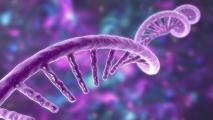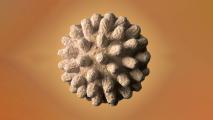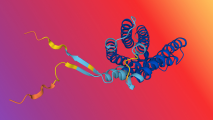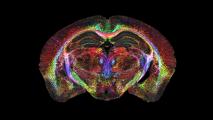
Biotech
Human history has been all but defined by death and disease, plague and pandemic. Advancements in 20th century medicine changed all of that. Now advancements in 21st century medicine promise to go even further. Could we bring about an end to disease? Reverse aging? Give hearing to the deaf and sight to the blind? The answer may be yes. And soon.
More
AI dramatically improved mRNA vaccines in just 11 minutes
A new AI tool can find the most stable mRNA sequence for a vaccine, leading to more effective shots that are less prone to degradation.
New drug candidates found in an unlikely place
Costa Rica’s famed sloths harbor bacteria in their fur which can create antibiotic compounds — a potential source of future therapies.
Study: Parenthood seems to rewire gray matter
A study found that couples who co-parent together display similar brain activity, suggesting they become greatly attuned to each other.
World’s first vaccine for RSV approved in the US
The FDA has approved the world’s first vaccine for RSV, a potentially deadly viral infection that has long eluded vaccination.
The first fecal transplant pill is heading to pharmacies
The FDA approval of the first fecal transplant pill could kick off an era in which we target the gut microbiome to treat many other diseases.
More Americans than ever have no friends. Here are 5 steps to make more friends.
The last decade has seen a steep drop in adult friendships and a worrying increase in loneliness. Is this the cost of our modern life?
Ancient viruses in the human genome can help fight cancer
Armed with a DoD grant, researchers are harnessing the genetic code of ancient viral infections to fight prostate cancer.
Complex brain activity detected in dying patients
Researchers have measured gamma waves, a sign of brain activity, in patients who were dying.
New Alzheimer’s drug slows cognitive decline by 35%
Eli Lilly’s new Alzheimer’s drug, donanemab, slowed cognitive decline by 35% in a phase 3 trial, but two people died from side effects.
Networks of silver nanowires seem to learn and remember, much like our brains
Self-organising networks of tiny silver wires appear to learn and remember in much the same way as the thinking hardware in our heads.
Earbud-like tech will monitor sleep for signs of Parkinson’s
An EEG device that’s worn in the ear during sleep could help doctors diagnose Parkinson’s and Alzheimer’s long before symptoms appear.
Insiders say Apple is building an “AI health coach”
Tech giant Apple is developing an app with an AI health coach to help you live a healthier lifestyle, according to a Bloomberg report.
Gene therapy reverses vision loss in primates — by making their eyes young again
A Harvard study found that a new gene therapy that reprograms cells to their younger state can reverse NAION-caused vision loss in primates.
The vicious cycle of food and sleep
More than a third of Americans don’t log enough hours in bed, provoking serious health impacts. Diet is an important, under-recognized reason.
“Relationships 5.0”: Are people going to start dating AI?
Online dating is so mainstream that you’re an outlier if you haven’t met your partner on an app — so why not AI?
Scientists discover “anxiety gene” in the brain — and a natural way to turn it off
The discovery of an “anxiety gene” — and a natural way to put the brakes on it — in mice could lead to new treatments for anxiety disorders.
How “centaur AI” will radically reshape the future of healthcare
With healthcare, it is not enough to spot patterns: we need to understand biological mechanisms. Ai can help us do it.
New gel destroys brain cancer in 100% of treated mice
A new brain cancer treatment not only cured 100% of mice that received it, but also trained their immune systems to fight future cancers.
Emotions get better with age
As people grow older, they gain greater control of their feelings. How do they do that — and can they teach young people a thing or two?
This brain image is 64 million times sharper than standard MRI
A new brain imaging technique that generates ultra-high resolution images of mouse brains could revolutionize neuroscience research.
Get inspired with the most innovative stories shaping the world around us.

































